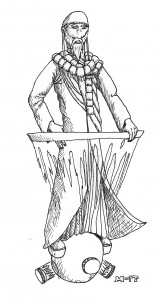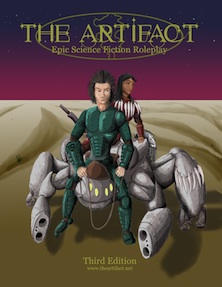 There are a lot of complicated things about RPGs. There are complicated rules, sometimes complicated math, complicated worlds, etc. These all feed into a world that is not just a flat boring place. Some people thrive on complex challenges others won’t touch it with a ten foot pole. Complicated can easily be taken too far.
There are a lot of complicated things about RPGs. There are complicated rules, sometimes complicated math, complicated worlds, etc. These all feed into a world that is not just a flat boring place. Some people thrive on complex challenges others won’t touch it with a ten foot pole. Complicated can easily be taken too far.
So how far is too far? As a GM how is it your job to manage complexity?
Sometimes recognizing complexity is easy. The player throws up their hands and says “This is too hard!” At other times complexity is more subtle. The player may be trying to keep up but is secretly struggling. Maybe the other players are more experienced or it just clicks with them for some reason and the player that’s struggling doesn’t want to admit it. If you watch their reaction time to a situation you’ll be able to identify a player that’s swamped. If they normally make reasonably quick decisions and are now taking longer and longer to decide on actions, they’re mentally taxed and it’s probably because they don’t know how to use the story or system to get out of the situation they’re in.
How to fix it
Sometimes taking a break can help. My players have often used even brief breaks to discuss the situation and develop a strategy. When the players that are comfortable start outlining how they want to resolve a situation, it often makes the rest of the situation clearer.
In some situations it’s the flood of rules to handle a situation that is too much for a player to memorize. In situations like this it’s generally the GM’s job to handle the rules and walk the players through. For some players this is a temporary thing, for others the handholding will continue as long as they play. Some people just don’t memorize these things (yeah I know it’s weird but you’ll have to get used to it).
What if everyone in the group is lost? Offer a short circuit solution. Give them the solution that has a piece missing that can be inserted by them handling a situation they can understand. Can’t figure out the clues to shut down the reactor? Hey look, there’s someone trapped by some rubble, he looks like he might work here. Can work wonders, the players are back in their element, they know how to solve their problem.


 The Free RPG Blog
The Free RPG Blog
Another great blog post! I feel that we hit a lot of the same problems – perhaps because out labours of love are similar…
I like your short circuit solution to keep them moving. If you find that you’re doing it too much then chances are you’re not putting in enough signposts to your puzzles. I would also add some negative impact of using the short circuit. If the short circuit is recognised by your players then they might just mess about – waiting for the GM to interject. Sure, the guy under the rubble can help but only if you promise to save his family!
I’ve had to use the short circuit several times in the past. When I first started using it, I was watching games grind to a halt and no one was having fun. Like you said, I usually attach some negative to choosing the short circuit. Usually that they don’t get to accomplish all their goals, just the main dangerous one. Starting another quest is a good idea, I should use that!
Pingback: News from Around the Net: 18-NOV-2011 | Game Knight Reviews